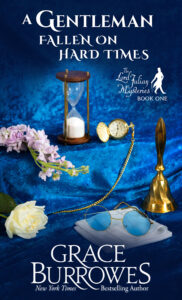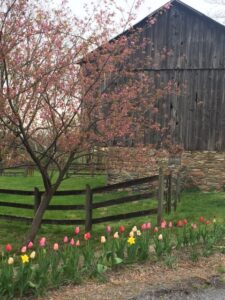 I am finishing up my third manuscript in the Lord Julian mystery series, and one thing I enjoy about a recurring protagonist is that I can get to know him–really get to know him. I don’t have to say good-bye to his lordship as a protagonist just because one book’s worth of problems have been solved.
I am finishing up my third manuscript in the Lord Julian mystery series, and one thing I enjoy about a recurring protagonist is that I can get to know him–really get to know him. I don’t have to say good-bye to his lordship as a protagonist just because one book’s worth of problems have been solved.
Julian is better acquainted than I could ever be with what’s called an honor culture, as opposed to a dignity culture. In a dignity culture (the present day US somewhat qualifies), small insults are ignored or peacefully resolved between the parties, the rule of law applies to everybody (“all men are created equal…” -ish), and public institutions–the courts, the free press, regulatory bodies, the educational systems, churches and so forth–enforce norms of good behavior. That’s the theory, in any case.
The historical Scottish borders and the American Old West are often described as honor cultures. No overarching rule of law or social institution provides a bulwark against chaos or peril in such settings. No individual rights or liberties are considered universal.  Every slight to a person’s good name has to be personally addressed, and personal integrity is highly valued. Personal status and personal accomplishments affect influence and standing–none of this created equal baloney. Whereas a dignity culture might become excessively litigious, an honor culture can descend into bloody feuds and vigilantism.
Every slight to a person’s good name has to be personally addressed, and personal integrity is highly valued. Personal status and personal accomplishments affect influence and standing–none of this created equal baloney. Whereas a dignity culture might become excessively litigious, an honor culture can descend into bloody feuds and vigilantism.
Regency society (and certainly American society of the day) was in transition between honor culture, which understood dueling, oligarchy, and bloody conquest, and dignity culture, which supported a free press, expanded suffrage, an impartial judiciary, and Thomas Jefferson’s lofty (patriarchal, and deeply hypocritical) rhetoric of equality.
 That being the case, Julian is surrounded by people who still value symbols of honor. Signet rings, family titles, dueling scars, regalia of office, and military forms of address carried into civilian life all made sense to Julian before he became a prisoner of war, then an injured veteran. By the time we meet him, he’s a man in transition.
That being the case, Julian is surrounded by people who still value symbols of honor. Signet rings, family titles, dueling scars, regalia of office, and military forms of address carried into civilian life all made sense to Julian before he became a prisoner of war, then an injured veteran. By the time we meet him, he’s a man in transition.
He has mustered out in disgrace, and doesn’t use his military rank if he can avoid it. He knows firsthand what it is to be stripped of all respect, and the idea that women, the poor, or children have no dignity worth defending strikes him as absurd, though it’s still entrenched in English law. His opinions on dueling wax profane, and he’s a far humbler fellow than the guy who bought his flashy regimentals and sailed off to teach Old Boney a lesson.
 Julian still has a badge or two of honor, though. Because his eyes were damaged by a battlefield explosion, he needs tinted spectacles to deal with strong sunlight. He wears them with pride, always has a spare pair on hand, and soon becomes closely identified with them in larger society. They announce to the world (that feels entitled to judge him unfairly) that he’s suffered for his country. His specs also afford him some privacy, to the extent that the eyes are windows to the soul.
Julian still has a badge or two of honor, though. Because his eyes were damaged by a battlefield explosion, he needs tinted spectacles to deal with strong sunlight. He wears them with pride, always has a spare pair on hand, and soon becomes closely identified with them in larger society. They announce to the world (that feels entitled to judge him unfairly) that he’s suffered for his country. His specs also afford him some privacy, to the extent that the eyes are windows to the soul.
My yard flowers might be badges of honor. I developed the habit of flower gardening only as foster care advocacy rubbed my nose in some fetid truths about a society that professes to value families and children. I will put some beauty into this world, and I will put the pretty where anybody driving past can see it. Every year, for as many seasons as I can manage. I will.
Do you have any badges of honor? Mementos of accomplishment on display for all to see? On display for YOU to see?







Hmmm, interesting! I don’t think I have any badges of honor for myself or for others to see. And I don’t like to display most of my accomplishments, although I m proud when people remark on the beautiful embroidery that I’ve done 🙂
I have tattoos on both of my calves, my forearms, and one shoulder. All 5 of them are large-ish and represent something special in my life: the horses I grew up with, a quote from Winnie-the-Pooh, books, and a scene of Ferdinand the Bull under the cork tree smelling flowers. I got my first tattoo when I was 55 years old. I considered each one a visual badge of honor representative of my life and the wisdom I’ve gained over time.
This is such an interesting essay, but obviously very challenging for us to come up with our own contributions, since we have few posts this morning! I had never thought of an “honor” culture vs.a “dignity” culture. What causes the change? Are there other types of cultures? I don’t have any tangible badges of honor like Lord Julian’s spectacles, but maybe internal ? Or activities? that I regard as honorable, or duties, behaving honorably …? I speak Spanish, not perfectly, but well enough to relate to people and I was an ESL teacher so now I do this as a volunteer, since I feel it’s an honor to be able to bridge the cultural and language divide.
I will borrow Make Kay’s comment except that it’s not embroidery, of which I do very little, but small quilts, of which I’ve done more though not lately (no place to leave sewing machine, etc. set up and too much trouble to set up and take down every time, so I read these days in my spare time).
I would say that a tattoo is a visible badge of honor but I’m too wary of needles and too indecisive to think of what I would like to see permanently to have any so far. (But I’m not dead yet, so it could still happen.)
And I agree with Jeannette that it is very challenging to come up with something which is why I almost didn’t make a comment (so thank you to previous commenters for giving me something to borrow).
My husband is dealing with a major slight to his personal integrity. In a “dignity” culture there is nothing he can do or say. Even in an honour culture, given the difference in “rank” he would be unable to challenge him. My husband’s friends who know the situation have suggested he leave the area. If that doesn’t sound like a plot from a different age!
Me, I’d seek redress at law, then social media and finish with a shot in the back. I don’t possess his integrity, patience or even temper.
I have a print on my wall that my best friend gave to me as a thank you for watching her 2 small kids (way before I had my own) for a week when she had to travel. We grew up together and she has always been in my life and I had the honor of being someone whom she could trust to take care of her baby and toddler and a friend close enough that she could ask. The print represents my personal accomplishment of a life long close friendship, which I value higher than my diplomas which are in a box somewhere.
I had to really think about this, believing that I didn’t have anything to add. However, the longer I sat here thinking, I looked at the living room wall where a framed copy of our wedding invitation, beautifully embellished with paper quilling by a friend, hangs. That was 40 years ago! I’m proud of how beautiful the the original invitation is (after all, I chose it!) and of the fact that it’s still relevant 40 years later.
Also, I hand make all of the cards sent for family and close friends. Some are pretty elaborate and I attach a “badge of honor” to the back of all of them that states “When it’s made with my hands, it comes from my heart.”
I think, perhaps, that false modesty accounts for why it took me so long to come up with these examples. I’ll bet if I took more time, I could come up with many more. A very thought provoking question, Grace.
I’m a gardener,too. Your colors are lovely and it looks as if you must have extensive gardens to produce as many varied stems at the same time. I think of gardening as a place where I can display creativity and my love for color.
Enjoy your blog and your books so much and am so happy you are working on another mystery series. I am on the 7th book of the Lady Violet series and find it very satisfying. I always hate to leave the characters when a book is over and with this series, I don’t have too! (At least not so soon). I, like you, am attempting to add some beauty to the world with flowers and have a small border beside my driveway where anybody driving up can see my efforts. Also, this year, I bought big pots for in front of my front porch for the same purpose. They bring me joy at the very least. Your tulips are lovely!
I would love to read an ARC copy if there are any still available. Thank you.
I really loved the first Lord Julian book, enough to rate it highly and leave a review on goodreads. I really like the series format, where there is time for the author to really develop the main characters and there is no rush to tie up loose ends and finish the book, which sometimes leaves the reader feeling vaguely dissatisfied. We become more invested in characters as we watch them meet challenges and grow, making us care more about them the more time we spend with them. I look forward to the next two in the series coming in the fall.